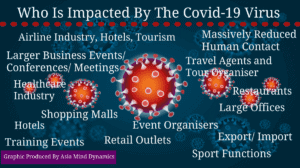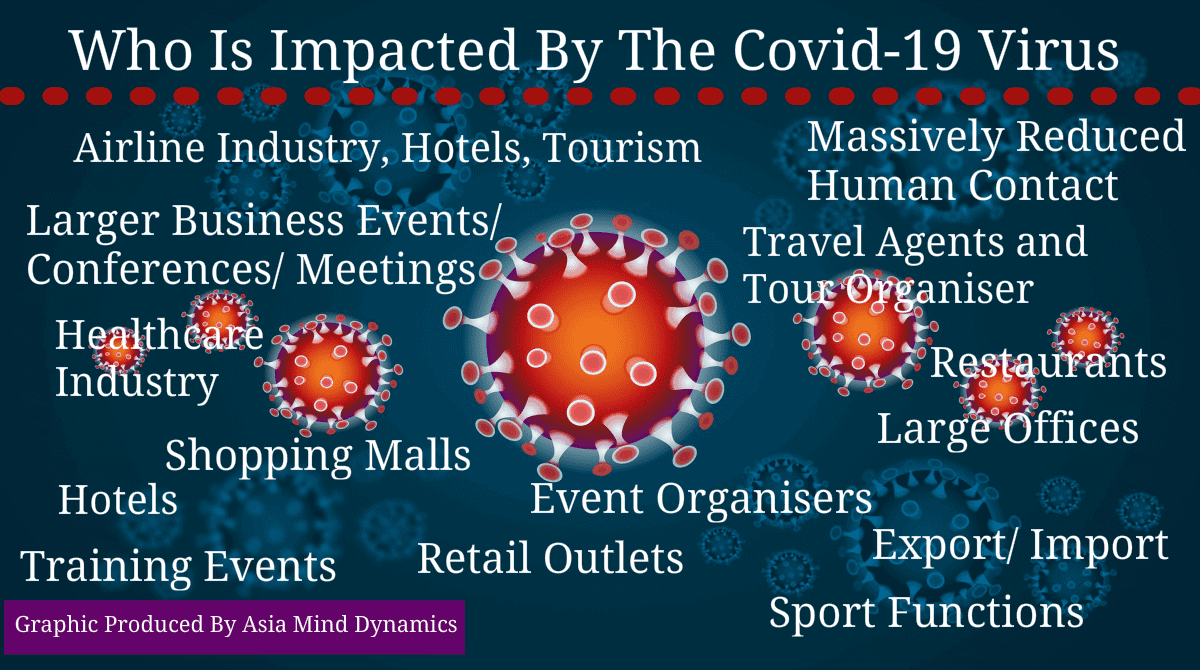Covid-19 and its impact on Human Relationships!
The Covid-19 virus is on everybody’s mind. People are scared, worried, follow the news, track the development, and wonder, when, not even if, they get affected.
We all know people who have been in contact with the Covid-19 virus already. How will it impact us? What will change in our lives?
Lives will change. Most likely forever. Many industries are affected already, many companies struggle to cope.

I read yesterday, that due to measurements to cope with the Covid 19 outbreak, Hong Kong’s average daily arrivals dropped from 130,000 in the lead up to the Lunar New Year holiday on January 25 to 65,000 in late January and 3,000 in February (Source).
Can you imagine the impact? Restaurants, retail outlets are closing, people lose their jobs.
But imagine the impact on personal relationships.
The mistrust, the hesitation in talking to strangers. The avoidance of touch. Massive!!
I feel that the impact on human relations will be enormous. People don’t touch each other anymore. Touch is so important in a relationship, from shaking hands to the nice big hug.
It is the fear, deep inside of us that the person that we might be talking to, might have the virus. Better stay away.
The article linked here describes the importance of the human touch and basically says that “Physical touch is the foundational element of human development and culture.”
“Scientific research now correlates physical touch with the following important areas:
1. Decreased violence. Less touch as a child leads to greater violence. American developmental psychologist James W. Prescott proposed that the origins of violence in society were related to the lack of mother-child bonding. Child developmental research illustrates that the absence of physical bonding and healthy attachmentbetween an adult and child may result in lifelong emotional disturbances.
2. Greater trust between individuals. Touch helps to bond people together. Daniel Keltner, the founding director of the Greater Good Science Center and professor of psychology at University of California, Berkeley, cites the work of neuroscientist Edmund Ross, who found that physical touch activates the brain’s orbitofrontal cortex, linked to feelings of reward and compassion. According to Keltner, “studies show that a simple touch can trigger release of oxytocin, aka ‘thelove hormone.'” Our skin contains receptors that directly elicit emotional responses, through stimulation of erogenous zones or nerve endings that respond to pain, according to researchers Auvray, Myin, and Spence.
3. Economic gain. Keltner links economic benefits to physical touch, probably because “touch signals safety and trust; it soothes. Basic warm touch calms cardiovascular stress. It activates the body’s vagus nerve, which is intimately involved with our compassionate response.” NBA teams whose players touch each other more, for example, win more games.
4. Decreased disease and stronger immune system. Physical touch may also decrease disease. According to research conducted at the University of North Carolina, women who receive more hugs from their partners have lower heart rates and blood pressure: “Hugs strengthen the immune system…The gentle pressure on the sternum and the emotional charge this creates activates the Solar Plexus Chakra. This stimulates the thymus gland, which regulates and balances the body’s production of white blood cells, which keeps you healthy and disease free.” Research at University of California’s School of Public Health found that getting eye contact and a pat on the back from the doctor may boost the survival rate of patients with complex diseases.
5. Stronger team dynamics. Paul Zak, author of The Moral Molecule, argues, “We touch to initiate and sustain cooperation.” He conducted a “neuroeconomics” study from which he argues that hugs or handshakes are likely to cause the release of the neurochemical oxytocin, which increases the chances that a person will treat you “like family,” even it you just met.
6. More non-sexual emotional intimacy. Interpersonal touch has a powerful impact on our emotions. Studies have shown that a gentle brush of a woman’s arm can boost a man’s chances in love; another study showed that two-thirds of women agreed to dance with a man who touched her on the arm a second or two before making the request.
7. Greater learning engagement. When teachers touch students platonically, it encourages their learning. French psychologist Nicolas Guéguen reports(link is external) that when teachers pat students in a friendly way, those students are three times as likely to speak up in class. Another recent study has found that when librarians pat the hand of a student checking out a book, that student says he or she likes the library more and is more likely to return.
8. Overall wellbeing. Adults require human touch to thrive. Keltner says, “In recent years, a wave of studies has documented some incredible emotional and physical health benefits that come from touch. This research is suggesting that touch is truly fundamental to human communication, bonding, and health.” As Sharon K. Farber says, “Being touched and touching someone else are fundamental modes of human interaction, and increasingly, many people are seeking out their own professional touchers and body arts teachers—chiropractors, physical therapists, Gestalt therapists, Rolfers, the Alexander-technique and Feldenkrais people, massage therapists, martial arts and T’ai Chi Ch’uan instructors. And some even wait in physicians’ offices for a physical examination for ailments with no organic cause—they wait to be touched.”
In conclusion: Physical touch is the foundational element of human development and culture. The growing preoccupation with digital media versus personal physical contact, combined with the social and legal restrictions over physical contact in our schools and workplaces, may unintentionally affect these factors negatively. To foster a safe social environment in a climate of mediated communication, we should intentionally hold on to physical touch.
Some positive developments:
-
- We become more health-conscious. People actually look out for their health. They are more conscious of what they are touching. Where they put their fingers and hands. And wash them more frequently and not just splash water onto them for a few seconds;
- Food delivery industry – no more restaurants, but eating at home (have a chance to build relationships?). I realised that restaurants are emptying out. Some experienced the shift to the online world already. Apps are massively being used to order food from home. This is going to accelerate. The premises will see less patrons, but food delivery will go up.
- Sanitiser industry and mask producers. Of course, sanitisers will be everywhere. This will become a booming industry,
- Massive move online of many industries and companies, who were at the sidelines earlier. More and more companies start moving their business online. Employees can work from home more frequently. Companies will have to increase their IT networking abilities. I am not sure if small companies can afford this, but big companies will surely see a trend to move more of their operation online.
Feel free to add on your own ideas or input. This is not a health advise but written as the personal opinion from the author.


